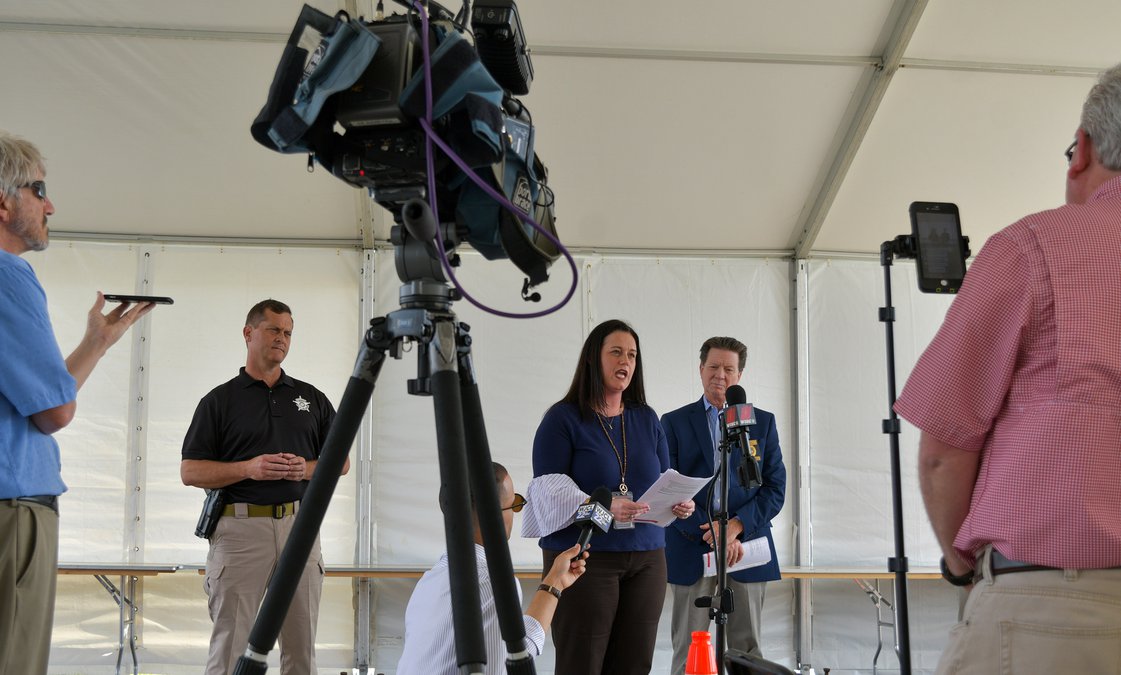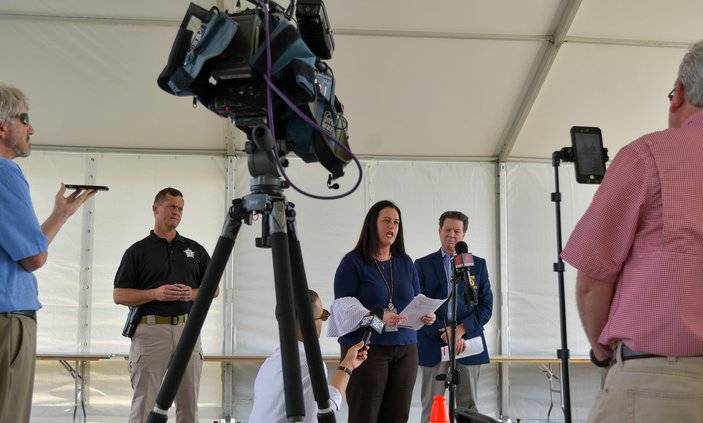Bulloch County residents with referrals will soon be able to submit specimens for testing for COVID-19, as the Southeast Health District is opening Specimen Point of Collection (SPOC) center at the Kiwanis Ogeechee Fairgrounds on Hwy. 67
The SPOC center will not accept walk-in visitors without a referral number, and testing will not be conducted at the center, said Cindy Hart, director of the Southeast Health District.
She, Bulloch County Public Safety/Emergency Management Director Ted Wynn, Bulloch County Manager Tom Couch and Bulloch County Sheriff Noel Brown met with media Wednesday afternoon at the site to announce the center’s opening.
The centers for COVID-19 testing are “for individuals who have been referred through their primary care provider,” Hart said. “The testing centers are not open for public visitation. The centers will be for collection only, and no results will be given immediately as they will be determined through an external lab system.”
Sheriff’s deputies will be on standby at all times the center is in operation in order to maintain the safety and cooperation of the public, Brown said.
Hart said only people meeting specific criteria “who have been evaluated and gone through the screening/referral process through a primary care provider and received an ID number, will be sent to the centers.”
Residents can also obtain referral ID numbers by calling the Southeast Health District COVID-19 hotline at 844-442-2681, Wynn said.
Tuesday, Bulloch County Commissioners approved the setting aside of $100,000 for emergency funds related to the COVID-19 pandemic. Couch said the SPOC is “ an excellent example of the reasons this was approved.”
No vaccine for COVID-19
The SPOC centers are not vaccine or testing centers, “Currently, there is no vaccine available for COVID-19,” she said. However, a vaccine in development is being tested on humans in Seattle WA.
The SPOC centers are “only collection centers to bring another testing opportunity to meet the needs of our community,” she said. “This does not replace testing options through primary care providers and other health entities.
As the COVID-19 pandemic unfolds, public health officials will adjust the scale of these centers according to need, “based upon the ever-evolving incident of COVID-19. Through many trainings and exercises, public health has steadily worked to prepare themselves for a large-scale event and are prepared for this response,” she said. It is not yet known how many people the centers will serve.
These COVID-19 sample collection centers are mainly for people most at risk, with those over 60; those with chronic health conditions such as heart and lung disease, hypertension and diabetes, Hart said.
Also a priority are healthcare workers, first responders, law enforcement and “others who come in contact every day with people who may be infected (but) are well and do not knowingly spread COVID-19 to others,” she said.
People who have recently traveled to areas with ongoing outbreaks of COVID-19 and have a fever with cough and shortness of breath within 14 days of your travel, or have been in contact with someone who is suspected to have COVID-19, they should stay home and call a primary care provider or local health department immediately.
“Be sure to
call before going to a doctor’s office, emergency room or urgent care center
and tell them about your recent travel and your symptoms,”
Hart said.
Prevention, not panic
People who do not show these symptoms (fever, shortness of breath, persistent cough) should stay home and follow basic hygiene and preventative measures to ensure they do not spread germs.
Wynn reminds residents that “this is still flu season) and pollen is starting to fall, so allergies and other illnesses may cause similar symptoms. People should monitor their health and call their health care provider if they feel their illness is serious, he said.
Basic prevention tips for not only COVID-19 but any communicable illness include washing hands often with soap and water for at least 20 seconds or use an alcohol-based sanitizer; avoid touching your eyes, nose and mouth with unwashed hands and avoid close contact with people who are sick.
The Southeast Health District echoes Center for Disease Control guidelines in suggesting people stay home if sick, covering a cough or sneeze with a tissue, then throw the tissue in the trash, and frequent cleaning and disinfecting frequently touched objects and surfaces.
For accurate and reliable information, contact the Southeast Health District at 912-285- or visit http://dph.georgia.gov/novelcoronavirus or www.cdc.gov/coronavirus/2019ncov. To know the current status of COVID-19 in Georgia, please visit DPH’s interactive tool at the following link: https://dph.georgia.gov/covid-19-daily-status-report.
Herald reporter Holli Deal Saxon may be reached at 912-489-9414.

